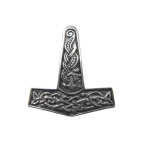|
So I DM the local gaming store's weekly DnD game. I've gotten into a bit of a conundrum. It's open to the public so we tend to have about 8 people show up every week. They players range in age from 8 to 20. I'm having a little difficulty reigning everyone in and getting everyone to have fun. The younger kids like running around killing things (some are prone to attacking each other) while the older ones try to tactfully think and want some sort of story. Anyone have any suggestions/hints for DM large groups of younger people? I've already done things like copy their character sheets and helping them do math. I also have been considering ditching rolling for init and just going around in a circle.
|
|
|
|

|
| # ¿ May 4, 2024 01:50 |
|
I am currently trying to convince one of the older players and a friend of mine to DM a separate group. I've set up the game in such a way that the actual party can change pretty easily to reflect some kids not showing up every week. The story is pretty light, they are new members of the Sewer Guild and must advance through the ranks of the Guild and also explore the sewer and other such things. My big problem is making combat run smoothly. I don't want to just tell them what they should do but they are pretty unorganized. The dragonborn paladin switched sides and attacked the party because the kobolds they were fighting "might be relatives" and the rouge spent two rounds "watching" before actually fighting. Neither of these really threatened a TPK, I had no intention of wiping them on their first fight, but any ideas on how to curb this behavior without railroading or making the kid feel like I am bossing them around? Actually the dragonborn switching sides added some story elements. The kid playing the paladin has decided he is looking for "where he belongs" in the world. Which is kind of cool.
|
|
|
|
I would like to give my players a town. It would be a small village that is pretty much on it's last legs when the PCs show up. I want them to have the option of building it up as a home base. (Side Note: they are currently low-level demon hunters in a land recently run over by demons.) My question is how should I go about doing this mechanically in 4e DND. I was planning on having the towns people ask the PCs to do quests for them, something related to the PCs other adventures. "Oh your going to the Ice Wastes? Well I hear there is a forgotten mage library up there..." Based on how many quests they do they would get town money to buy Lair Items from AV2 for the town. That is what I am currently thinking at least. My original idea was to give them Town Points to spend buffing up different parts of the town, like Library, or Militia. I liked that because it forced them to debate and agree on HOW to spend the points. I could never figure out a goo system for giving them out however. I'm wondering if anyone has any sort of advice on a better way to do this, or feed back on the idea I outlined here.
|
|
|




